Friday, May 24, 2024. Annette’s News Roundup.
I think the Roundup makes people feel not so alone.
To read an article excerpted in this Roundup, click on its blue title. Each “blue” article is hyperlinked so you can read the whole article.
Please feel free to share.
Invite at least one other person to subscribe today! Here 👇 is the link to share for others to subscribe. https://buttondown.email/AnnettesNewsRoundup
Remember: when you share the Roundup, you are fighting Fascism and helping to bring about a Democratic victory in 2024.
_________________________________________________
Joe is always busy.
Biden administration cancels $7.7 billion in student debt for 160,500 people. Here's who qualifies. - CBS News.
The White House on Wednesday said it has approved $7.7 billion of student debt cancellation for 160,500 borrowers, part of its ongoing effort to provide relief after the Supreme Court last year blocked President Joe Biden's plan for broad-based college loan forgiveness.
With the latest round of forgiveness, the administration has erased a total of $167 billion in student loans for 4.75 million people, or about 1 in 10 student loan borrowers, the Department of Education said.
The people who qualify for forgiveness in the latest round of debt cancellation include public servants such as teachers and law enforcement officers, as well as tens of thousands of people who have signed up for Biden's new loan repayment program, called SAVE. That program, created last year, pegs a borrower's monthly payment to their income, lowering their financial payments, and is designed to fix a pitfall of earlier repayment programs that allowed interest to snowball.
"One out of every 10 federal student loan borrowers approved for debt relief means one out of every 10 borrowers now has financial breathing room and a burden lifted," U.S. Secretary of Education Miguel Cardona said in the statement.
On Thursday, President Biden and First Lady Jill Biden hosted a state dinner to honor Kenyan President William Ruto and first lady Rachel Ruto.
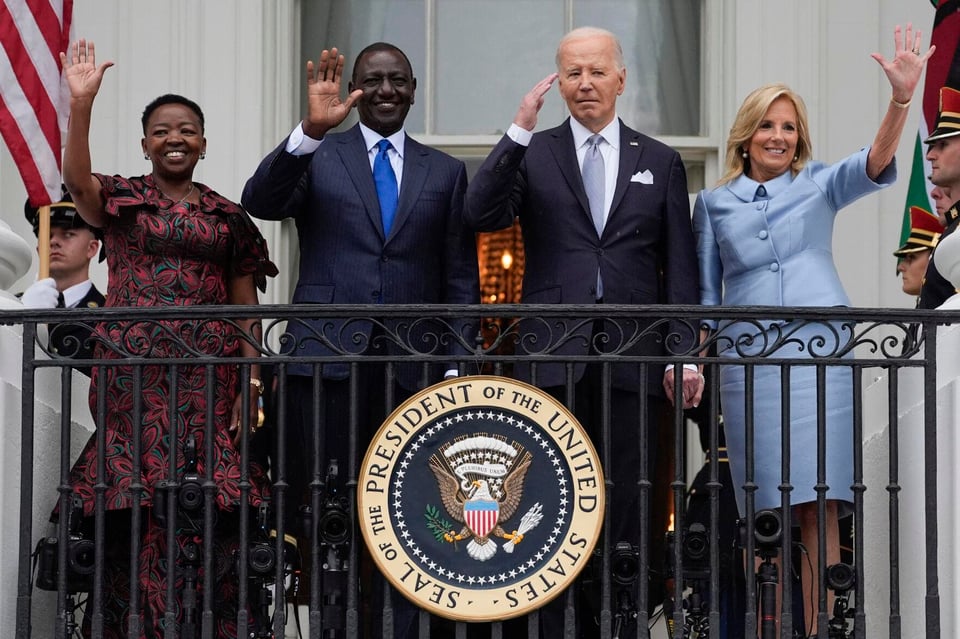
President Biden Names Fiftieth Round of Judicial Nominees | The White House.
The President is announcing his intent to nominate two individuals to federal circuit courts and two individuals to federal district courts—all of whom are extraordinarily qualified, experienced, and devoted to the rule of law and our Constitution.
These choices also continue to fulfill the President’s promise to ensure that the nation’s courts reflect the diversity that is one of our greatest assets as a country—both in terms of personal and professional backgrounds.
This will be President Biden’s fiftieth round of nominees for federal judicial positions, bringing the number of announced federal judicial nominees to 244.
United States Circuit Court Announcements
Karla M. Campbell: Nominee for the United States Court of Appeals for the Sixth Circuit
Karla M. Campbell is of counsel at the law firm Stranch Jennings & Garvey PLLC in Nashville, Tennessee. She first joined the firm in 2009, became a partner in 2015, and then became of counsel in 2022. From 2010 to 2011, Ms. Campbell served as a law clerk for Judge Jane Stranch on the U.S. Court of Appeals for the Sixth Circuit. From 2008 to 2009, Ms. Campbell was an attorney at the law firm Watson & Renner in Washington, D.C. She received her J.D. from Georgetown University Law Center in 2008 and her B.A. from the University of Virginia in 2002.
Justice Julia M. Lipez: Nominee for the United States Court of Appeals for the First Circuit
Justice Julia M. Lipez has been a justice on the Maine Superior Court since 2022. From 2011 to 2022, Justice Lipez worked as an Assistant United States Attorney in the U.S. Attorney’s Office for the District of Maine, where she served as Appellate Chief from 2019 to 2022. Prior to that, Justice Lipez worked as an associate and then a senior associate at Wilmer Cutler Pickering Hale and Dorr LLP in New York from 2007 to 2011. She served as a law clerk for Judge Diana Gribbon Motz on the U.S. Court of Appeals for the Fourth Circuit from 2006 to 2007. Justice Lipez received her J.D., with distinction, from Stanford Law School in 2006 and her B.A., magna cum laude, from Amherst College in 2002.
United States District Court Announcements
Catherine Henry: Nominee for the United States District Court for the Eastern District of Pennsylvania
Catherine Henry has been an Assistant Federal Defender in the Federal Community Defender’s Office for the Eastern District of Pennsylvania since 2001. Ms. Henry previously worked as a public defender at the Defender Association of Philadelphia from 1996 to 2001. Before that, she was a staff attorney at the Feminist Majority Foundation in Arlington, Virginia from 1995 to 1996. She received her J.D. from the District of Columbia School of Law in 1995 and her B.A. from Drew University in 1991.
Mary Kay Lanthier: Nominee for the United States District Court for the District of Vermont
Mary Kay Lanthier has been the supervising attorney in the Rutland County Public Defender’s Office since 2007. She was previously a public defender with the Addison County Public Defender’s Office from 2000 to 2003. Ms. Lanthier also worked in private practice as an associate and then a partner at Marsh & Wagner, PC, from 2003 to 2007 and as an associate at Keiner & Dumont, PC, from 1998 to 2000. From 1996 to 1998, she served as a law clerk for the judges of the Vermont Trial Court in the Chittenden County and Addison County Courts. Ms. Lanthier received her J.D. from Northeastern University School of Law in 1996 and her B.A. from Amherst College in 1993.
Biden sets records for judicial diversity.
Senate Confirms Biden’s 200th Judge in Historic Feat for Court Diversity.
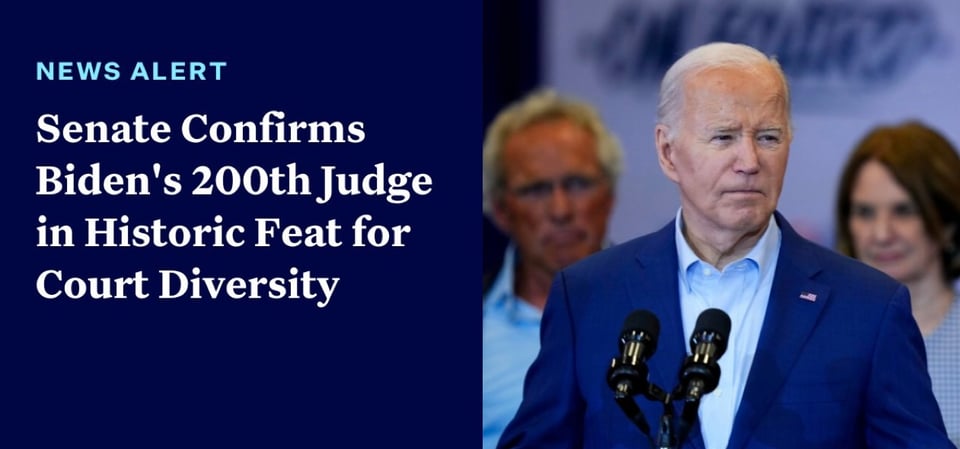
WASHINGTON, D.C. — The U.S. Senate confirmed President Joe Biden’s 200th federal judge today, which is more judicial appointments than the past five presidents had at this point in their administrations, according to the Federal Judicial Center.
Biden has also nominated the most diverse federal judges of any president in history.
“These judges are exceptionally well-qualified. They come from every walk of life, and collectively, they form the most diverse group of judicial appointees ever put forward by a President – 64% are women and 62% are people of color,” Biden said in a statement today.
This is over twice as many women and more than three times as many people of color confirmed under the Trump administration, Senate Majority Leader Chuck Schumer said today on the Senate floor.
“We’ve confirmed more judges, in other words, who embody the very ideal of America: a place where the rule of law is protected, where the rights of all are honored, and where everyone – everyone – gets a fair shake,” Schumer said.
Also, on the Senate floor today, Sen. Dick Durbin (D-Il.), chair of the Senate Committee on the Judiciary, said that Biden has appointed more Black women to the federal circuit courts than all previous presidents combined.
Biden also noted the diversity in the judges’ professional backgrounds, having “worked in every field of law—from labor lawyers fighting for working people to civil rights lawyers fighting to protect the right to vote,” with Schumer adding that it is important that federal judges are “not just partners in big law firms.”
Biden’s most notable appointment over the last four years is U.S. Supreme Court Justice Ketanji Brown Jackson. She made history in 2022 as the first Black woman to serve on the nation’s highest court.
“It has taken 232 years and 115 prior appointments for a Black woman to be selected to serve on the Supreme Court of the United States, but we’ve made it. We’ve made it – all of us,” Jackson said in a speech in April 2022 shortly after her Senate confirmation. (Democracy Docket).
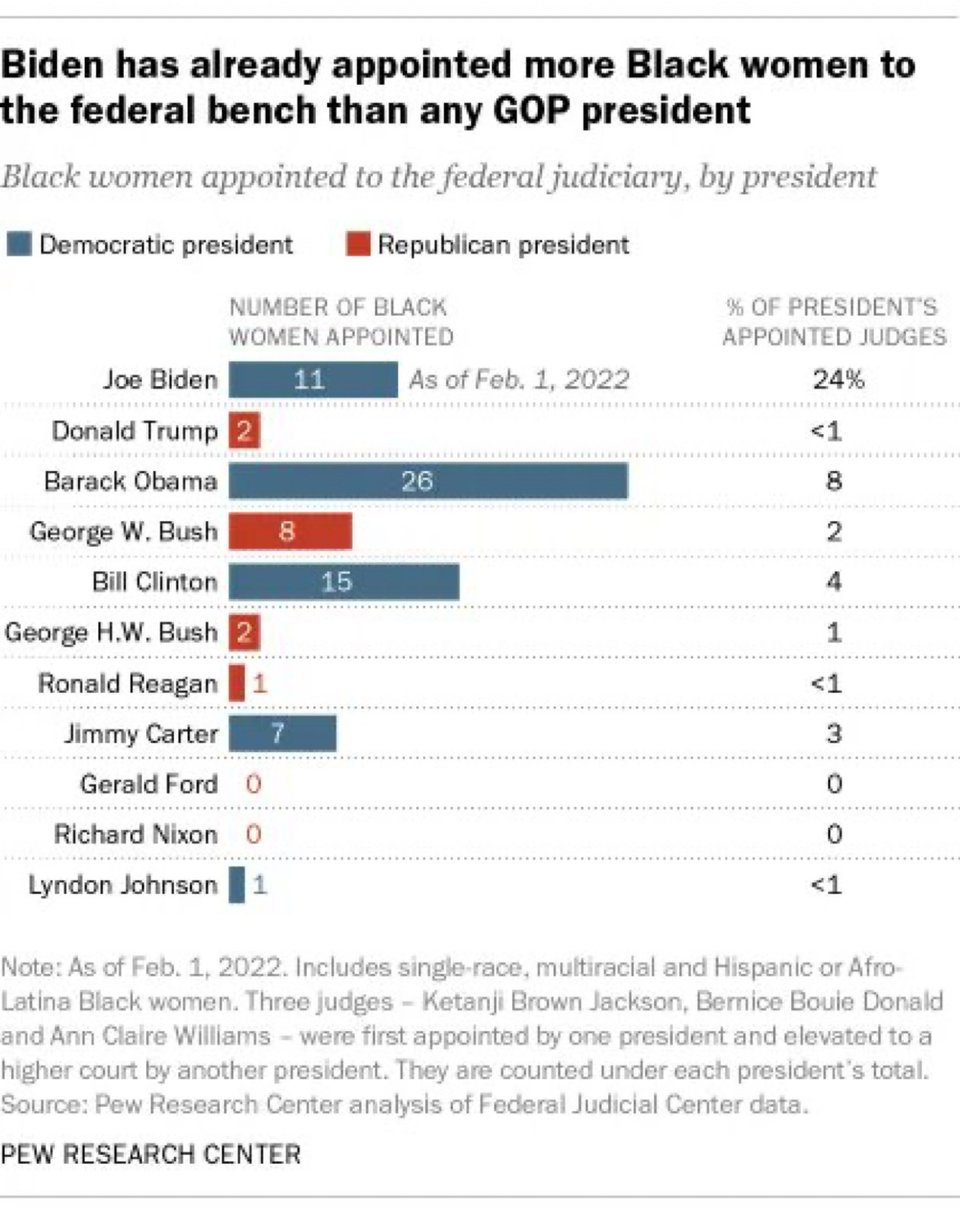
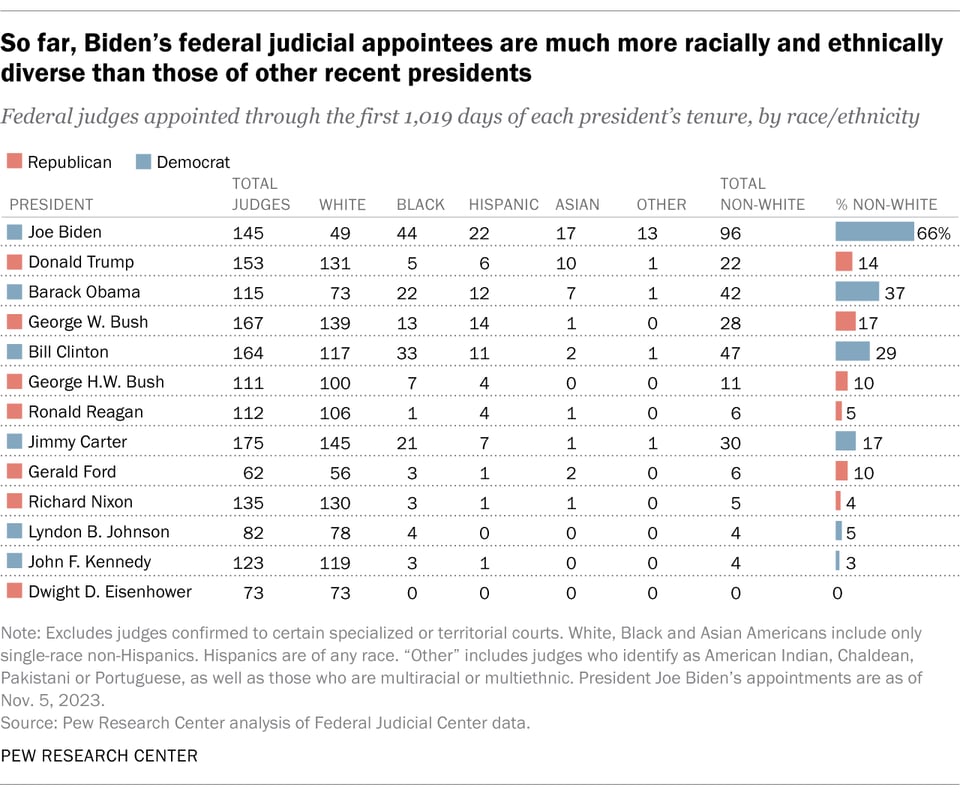
_________________________________________________
Kamala is always busy.
Today, we celebrate the confirmation of the 200th federal judge under the Biden-Harris Administration.
— Vice President Kamala Harris (@VP) May 22, 2024
These exceptionally qualified individuals are committed to upholding the rule of law and are the most diverse group of judicial nominees in our nation's history. pic.twitter.com/p3xfKoceA4
_________________________________________________
Oh that Alito.
More News about a flag Alito flew.
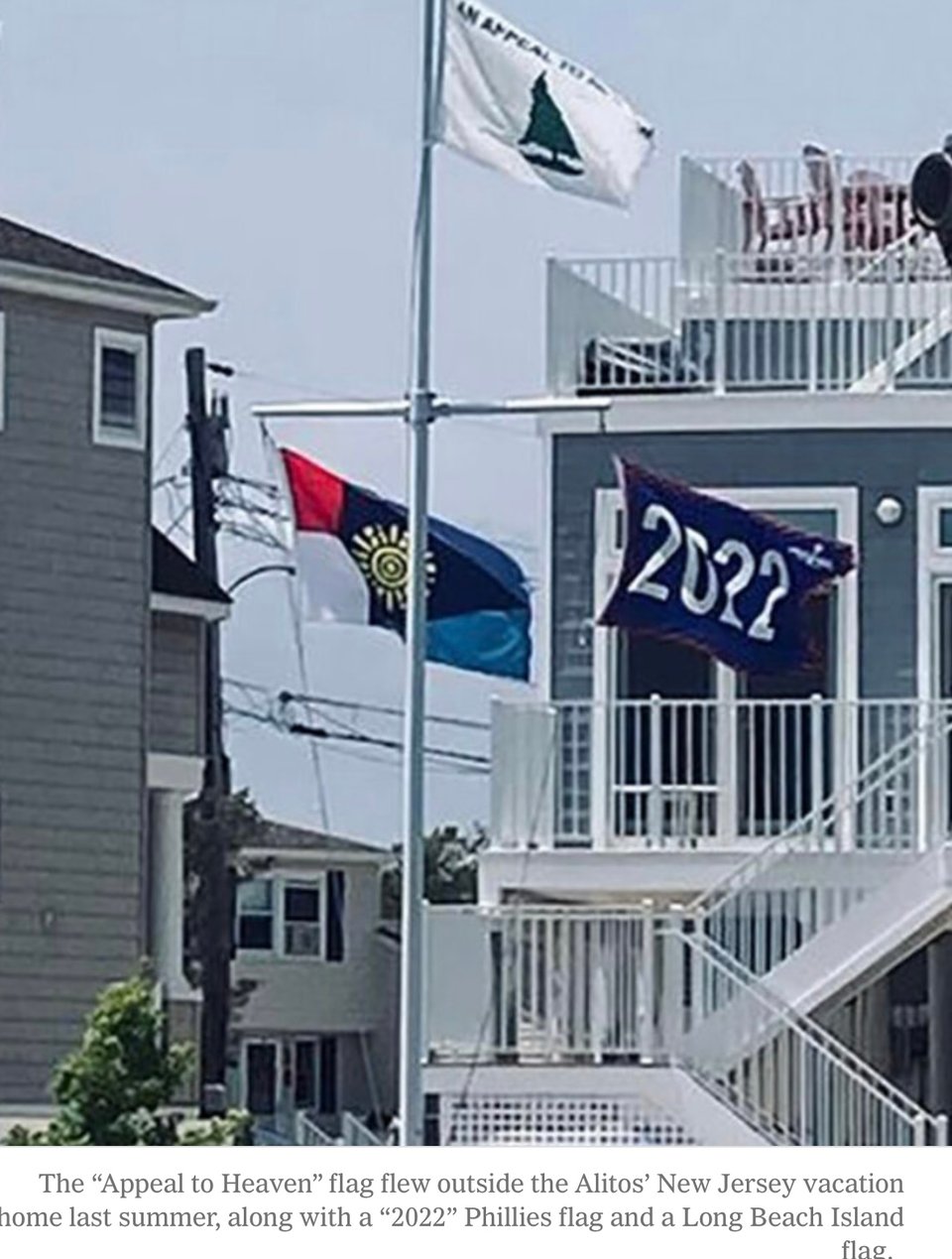
“More recently, the January 6 rioters carried it, and so have neo-Nazis. It is the same flag that House speaker Mike Johnson (R-LA) displays outside of his congressional office. Scholar of religion Bradley Onishi noted: “It’s a flag symbolizing Christian revolution. It’s used by extremists.” (Source. Letters from an American, Heather Cox Richardson).
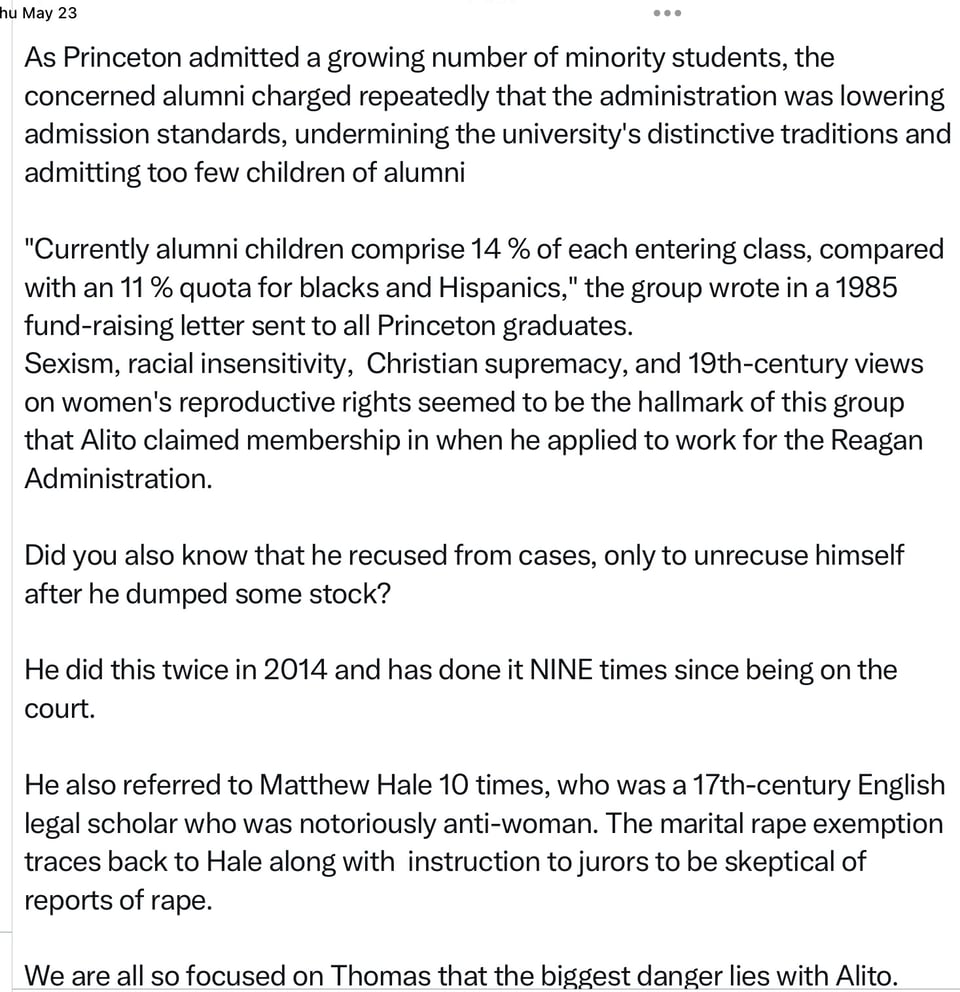
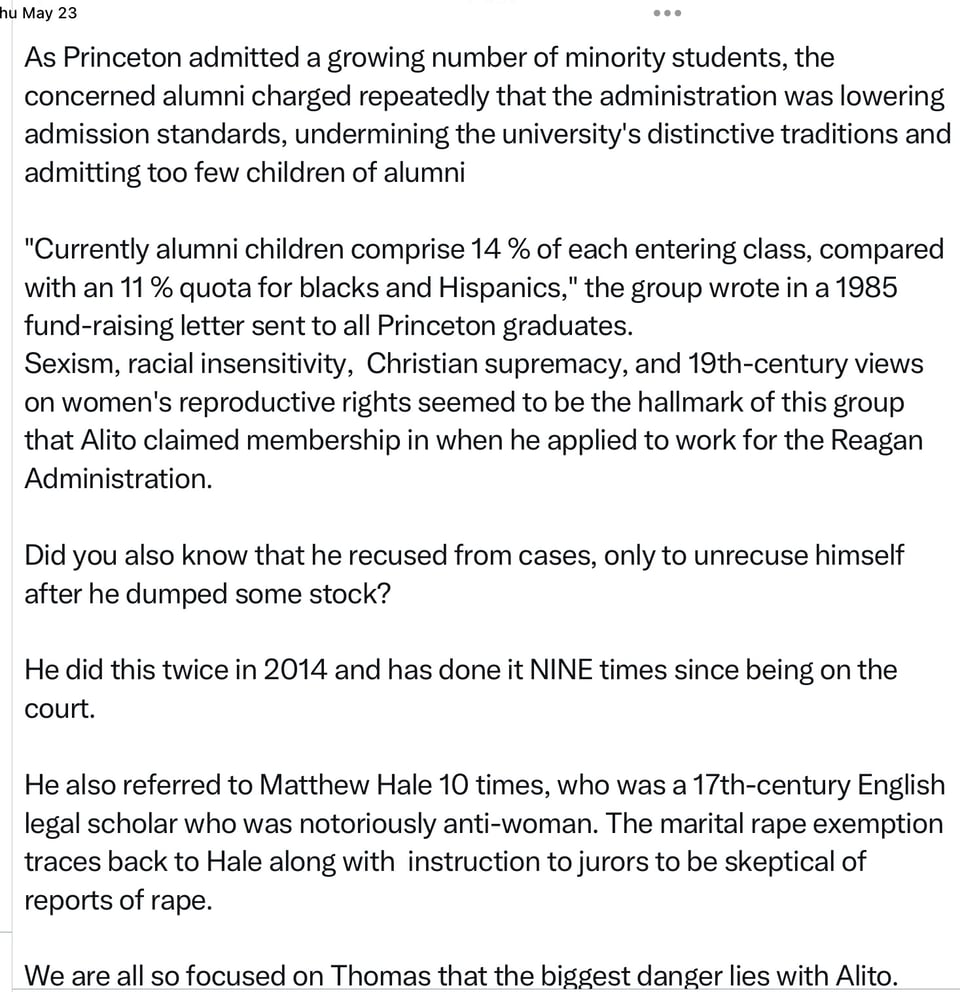
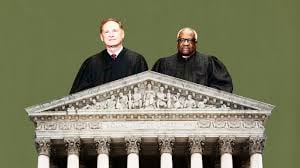
Hmm… both Alito and Thomas endanger us. One is no better or no worse than the other. Both disgrace the Supreme Court.
Alito’s Court decides.
Sad news I don’t like to post, from the Supreme Court.
It is not the Roberts’ court anymore.
Supreme Court Sides With Republicans Over South Carolina Voting Map.
The case concerned a constitutional puzzle: how to distinguish the roles of race and partisanship in drawing voting maps when Black voters overwhelmingly favor Democrats.
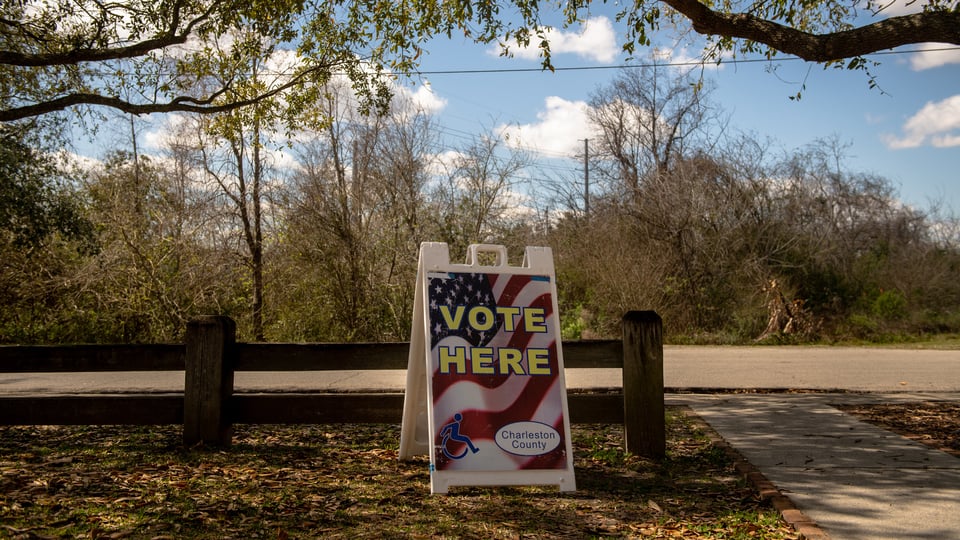
South Carolina’s First Congressional District had elected a Republican every year since 1980, with the exception of 2018. But after a close race in 2020, Republican lawmakers redrew it.
The Supreme Court cleared the way on Thursday for South Carolina to keep using a congressional map that a lower court had deemed an unconstitutional racial gerrymander that resulted in the “bleaching of African American voters” from a district.
The conservative majority, by a 6-to-3 vote, returned the case to the lower court, handing a victory to Republicans by allowing them to maintain boundaries that helped make the district in question a party stronghold.
The immediate effect of the ruling will be limited, as the court’s delay in ruling had already ensured that this year’s elections would take place under the contested map. But the majority opinion, written by Justice Samuel A. Alito Jr., will have an impact beyond South Carolina in the years to come, said Richard L. Hasen, a law professor at the University of California, Los Angeles.
“Justice Alito for a court majority has once again come up with a legal framework that makes it easier for Republican states to engage in redistricting to help white Republicans maximize their political power,” Professor Hasen said.
The ruling was the latest in a series of closely divided decisions on elections that are a distinctive element of the work of the court led by Chief Justice John G. Roberts Jr., including ones that have amplified the role of money in politics, made it easier to restrict voting and exempted partisan gerrymandering from review in federal court.
The trend is not entirely uniform, as the court ruled last year that Alabama lawmakers had diluted the power of Black voters in drawing a congressional voting map. But the overall pattern has been to limit the oversight of elections by Congress and the federal courts, often in ways that have benefited Republicans.
In the case decided Thursday, Alexander v. South Carolina State Conference of the N.A.A.C.P., No. 22-807, the court’s majority held that courts must generally credit lawmakers’ assertions that their goal in redistricting was partisan, which is permissible, rather than based on race, which is not. “We start with a presumption that the legislature acted in good faith,” Justice Alito wrote.
Quoting earlier decisions, he wrote that courts should avoid grave accusations against state lawmakers.
“When a federal court finds that race drove a legislature’s districting decisions,” he wrote, “it is declaring that the legislature engaged in ‘offensive and demeaning’ conduct that ‘bears an uncomfortable resemblance to political apartheid.’ We should not be quick to hurl such accusations at the political branches.”
In dissent, Justice Elena Kagan accused the majority of erecting hurdles to make it all but impossible to challenge voting maps as racial gerrymanders.
“The proper response to this case is not to throw up novel roadblocks enabling South Carolina to continue dividing citizens along racial lines,” she wrote, in an opinion joined by Justices Sonia Sotomayor and Ketanji Brown Jackson. “It is to respect the plausible — no, the more than plausible — findings of the district court that the state engaged in race-based districting. And to tell the state that it must redraw” the challenged district, “this time without targeting African-American citizens.”
Chief Justice Roberts and Justice Clarence Thomas, Neil M. Gorsuch, Brett M. Kavanaugh and Amy Coney Barrett joined Justice Alito’s majority opinion. In a concurring opinion, Justice Thomas said he would have gone further, getting out of the business of assessing claims of racial gerrymandering entirely.
“The court has no power to decide these types of claims,” he wrote. “Drawing political districts is a task for politicians, not federal judges. There are no judicially manageable standards for resolving claims about districting, and, regardless, the Constitution commits those issues exclusively to the political branches.”
A unanimous three-judge panel of the Federal District Court in Columbia, S.C., ruled in early 2023 that the state’s First Congressional District, drawn after the 2020 census, violated the Constitution by making race the predominant factor.
The panel put its decision on hold while Republican lawmakers appealed to the Supreme Court, and the parties asked the justices to render a decision by Jan. 1. After that deadline passed, the panel said in March that the 2024 election would have to take place under the map it had rejected as unconstitutional.
“With the primary election procedures rapidly approaching, the appeal before the Supreme Court still pending and no remedial plan in place,” the panel wrote, “the ideal must bend to the practical.”
In effect, the Supreme Court’s inaction had decided the case for the current election cycle.
The contested district, anchored in Charleston, had elected a Republican every year since 1980, with the exception of 2018. But the 2020 race was close, with less than one percentage point separating the candidates, and Republican lawmakers “sought to create a stronger Republican tilt” in the district after the 2020 census, the panel wrote.
The lawmakers achieved that goal, the panel found, in part by the “bleaching of African American voters out of the Charleston County portion of Congressional District No. 1.”
The new House map moved 62 percent of Black voters in Charleston County from the First District to the Sixth District, a seat that Representative James E. Clyburn, a Black Democrat, has held for 31 years.
The move helped make the new First District a Republican stronghold. In November, Nancy Mace, the Republican incumbent, won re-election by 14 percentage points.
Republican lawmakers acknowledged that they had redrawn the First District for partisan gain. But they said they had not considered race in the process.
The panel ruled that the district’s boundaries violated the Constitution. But the panel rejected challenges to two other House voting districts, saying that civil rights groups had failed to demonstrate that the districts had been predominantly drawn to dilute Black voting power.
The Supreme Court has called for very close scrutiny of a state’s actions when race is shown to be the predominant reason for drawing legislative districts. That principle, rooted in the Constitution’s equal protection clause, is often invoked to limit the creation of districts that empower minority voters.
In this case, though, the challenge came from the opposite direction, with civil rights groups saying that the map hurt Black voters by moving them from one congressional district to another.
In their Supreme Court appeal, South Carolina Republicans argued that the panel should have presumed that they had acted in good faith, as required by Supreme Court precedent, and analyzed the district as a whole.
“The result,” the lawmakers wrote, quoting from an earlier decision, “is a thinly reasoned order that presumes bad faith, erroneously equates the purported racial effect of a single line in Charleston County with racial predominance across District 1, and is riddled with ‘legal mistakes’ that improperly relieved plaintiffs of their ‘demanding’ burden to prove that race was the ‘predominant consideration.’”
The challengers, represented by the American Civil Liberties Union and the N.A.A.C.P. Legal Defense and Educational Fund, told the justices that “the panel correctly found that race was the gerrymander’s primary vehicle.”
“That predominant reliance on race is impermissible even if mapmakers used race as a proxy for politics,” the challengers’ brief said.
Courts must disentangle the two factors in constitutional challenges to voting maps, Justice Alito wrote.
”As far as the federal constitution is concerned, a legislature may pursue partisan ends when it engages in redistricting,” he wrote. “By contrast, if a legislature gives race a predominant role in redistricting decisions, the resulting map is subjected to strict scrutiny and may be held unconstitutional.”
He added, “These doctrinal lines collide when race and partisan preference are highly correlated.
Justice Alito criticized the challengers for not proposing their own map. “Without an alternative map,” he wrote, “it is difficult for plaintiffs to defeat our starting presumption that the legislature acted in good faith.”
In dissent, Justice Kagan said the majority had introduced a new and onerous requirement. “As of today,’ she wrote, “courts must draw an adverse inference against those plaintiffs when they do not submit a so-called alternative map — no matter how much proof of a constitutional violation they otherwise present.” (New York Times).
One more thing.
Clarence Thomas attacks Brown v. Board ruling in South Carolina voting map opinion.
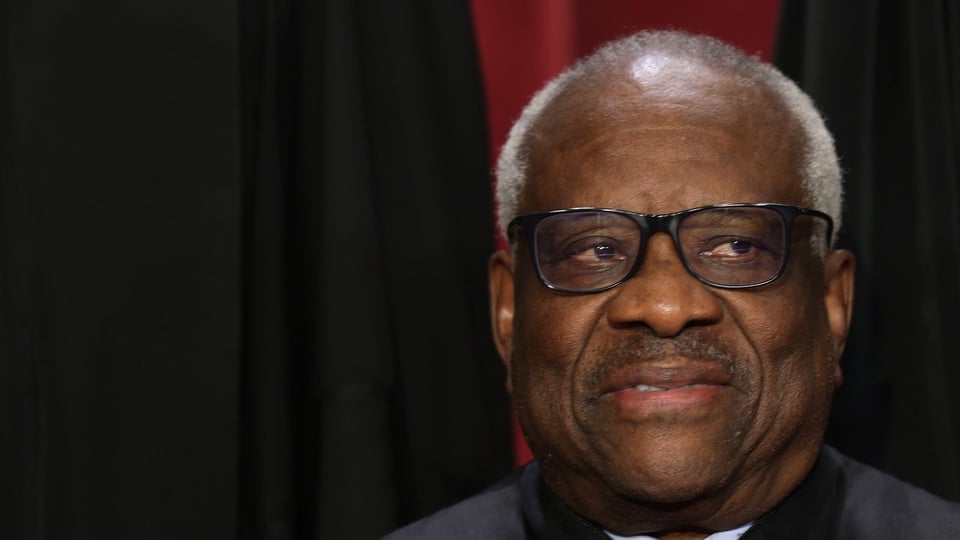
Supreme Court Justice Clarence Thomas issued a strong rebuke of the Brown v. Board of Education ruling on Thursday, suggesting the court overreached its authority in the landmark decision that banned separating schoolchildren by race.
Why it matters: Thomas attacked the Brown decision in a concurrence opinion that allowed South Carolina to keep using a congressional map that critics say discriminated against Black voters.
Driving the news: The court "took a boundless view of equitable remedies" in the Brown ruling, wrote Thomas, who in 1991 replaced Supreme Court Justice Thurgood Marshall — the first Black Supreme Court Justice and the lead lawyer in the Brown case.
Those remedies came through "extravagant uses of judicial power" to end racial segregation in the 1950s and 60s, Thomas wrote.
Federal courts have limited power to grant equitable relief, "not the flexible power to invent whatever new remedies may seem useful at the time," he said, justifying his opinion to keep a predominantly white congressional district in South Carolina.
Zoom out: The U.S. marked the 70th anniversary of the landmark Brown v. Board of Education ruling last week.
The 9-0 decision declared the "separate but equal" doctrine unconstitutional and helped usher in the Civil Rights Movement, though it took two decades to dismantle some school segregation policies.
State of play: An Axios review found American public schools are growing more separate and unequal even though the country is more racially and ethnically diverse than ever.
Racial segregation in schools across the country has increased dramatically over the last three decades, according to two new reports and an Axios review of federal data.
The resegregation of America's public schools coincides with the rise of charter schools and school choice options and as civil rights groups have turned away from desegregation battles.
Zoom in: Segregated schools disproportionately hurt Black and Latino studentssince those schools tend to have fewer resources, more teacher shortages, higher student-to-school counselor ratios and fewer AP class options.
Between the lines: Thomas has always been viewed suspiciously — if not downright hated — by civil rights advocates for repackaging arguments once made by segregationists in the name of supporting broad beliefs about limited government action.
His concurring opinion also comes as he faces criticism following a ProPublica ethics investigation last year, which found that he failed to disclose costly trips sponsored by a noted Republican megadonor.
Critics have also spotlighted Thomas' wife, Ginni Thomas, for trying to reverse the 2020 presidential election results and Justice Thomas for not recusing himself from Supreme Court decisions about the Jan. 6 Capitol riot.
Go deeper: School segregation surges 70 years after Brown v. Board ruling
(Axios).
_________________________________________________
Democratic Senators begin look into Trump corruption.
Senate Democrats Open Inquiry Into Trump’s $1 Billion Request of Oil Industry.
Two committees are seeking information from oil executives about a dinner where, the lawmakers say, the former president proposed a quid pro quo,
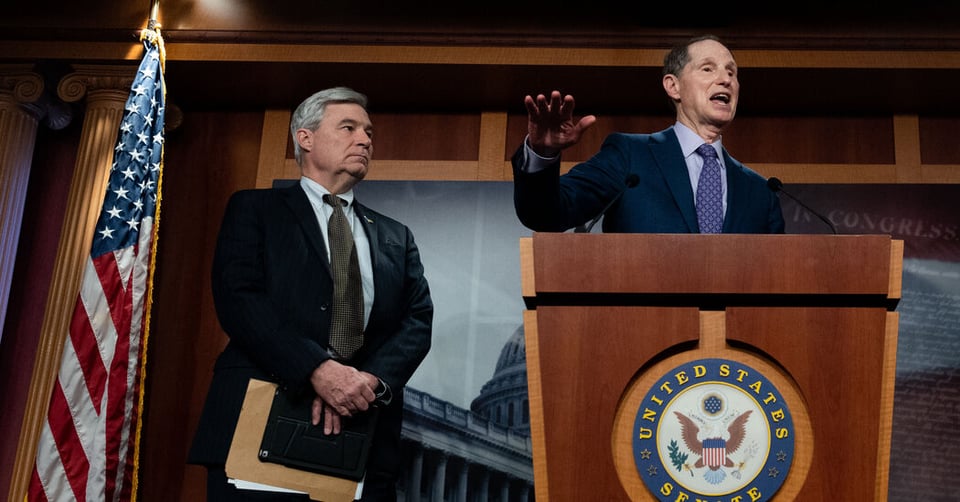
Senator Sheldon Whitehouse of Rhode Island, left, and Senator Ron Wyden of Oregon are demanding that oil companies reveal details of a meeting with the former president.
Senate Democrats opened an investigation on Thursday into former President Donald J. Trump’s meeting with oil and gas executives last month to determine whether Mr. Trump offered a “policies-for-money transaction” when he asked for $1 billion for his 2024 campaign so he could retake the White House and delete President Biden’s climate regulations.
The investigation is the second congressional inquiry into the April 11 fund-raising dinner at Mar-a-Lago, Mr. Trump’s private club in Florida. Over a chopped steak dinner, Mr. Trump told about 20 oil and gas executives that they would save far more than $1 billion in avoided taxes and legal fees after he repealed environmental regulations, according to several people who were present and who requested anonymity to discuss a private event.
The former president has vowed to “drill, baby, drill” if he wins in November. He has made no secret of his plans to end Mr. Biden’s policies that support wind and solar energy as well as electric vehicles.
On Wednesday Mr. Trump headlined a fund-raiser for MAGA Inc., a super PAC, that was hosted by three oil executives at a five-star hotel in Houston. One host was Kelcy Warren, a billionaire who owns a pipeline empire with an ambitious international expansion plan that depends on new export terminals. Mr. Biden paused permits for new terminals in January. Another was Harold G. Hamm, one of the pioneers of the shale oil boom that turned the United States into the world’s largest crude producer. The third, Vicki Hollub, leads Occidental Petroleum, a Houston-based oil company.
In letters sent Thursday morning to top executives of eight oil companies and a trade group, the chairmen of two Senate committees, Senator Sheldon Whitehouse of Rhode Island and Senator Ron Wyden of Oregon, sought details of the executives’ participation in the meeting and accused them and Mr. Trump of engaging in a quid pro quo.
“Time and time again, both Mr. Trump and the U.S. oil and gas industry have proved they are willing to sell out Americans to pad their own pockets,” the senators wrote to companies.
They accused the industry and the Trump campaign of “conferring on how to trade campaign cash for policy changes.”
None of the companies responded to a request for comment. Andrea Woods, a spokeswoman for the American Petroleum Institute, the oil industry’s main lobbying group, said in a statement, “This is yet another election-year stunt to distract from America’s need for more energy, including more oil and natural gas, to power our economy and combat persistent inflation.”
At the Mar-a-Lago dinner, Mr. Trump promised to immediately end the Biden administration’s pause on permits for new facilities that export liquefied natural gas, according to people who attended the meeting. That issue has galvanized the oil and gas industry against Mr. Biden, according to industry lobbyists.
Mr. Biden hit pause on new permits in January, saying he wanted his administration to study how gas exports affect climate change, the economy and national security. On Thursday, Energy Secretary Jennifer Granholm told Congress the pause would be lifted by early 2025.
Mr. Trump also criticized Mr. Biden’s restrictions on drilling on federal lands and in federal waters and promised to “bring back” the energy industry. (In fact, the oil and gas production have set records under the Biden administration and the United States is the world’s leading exporter of liquefied natural gas. Even with the pause on permits for new export terminals, the United States is still on track to nearly double its export capacity by 2027 because of projects already permitted and under construction.)
Lawmakers wrote to the chief executives of Cheniere Energy Inc., Chesapeake Energy, Chevron, Continental Resources, EQT Corporation, Exxon Mobil, Occidental Petroleum and Venture Global, as well as the president of the American Petroleum Institute.
Mr. Whitehouse, who leads the Senate Committee on the Budget, and Mr. Wyden, head of the Senate Committee on Finance, asked for copies of any draft executive orders, regulatory proposals or other policy-related documents that the companies may have created “for the purpose of potential use in a possible Trump administration.”
They are also seeking details of all campaign donations made by the companies, or any affiliated political action committees, to support Mr. Trump.
The joint inquiry is the second congressional examination of the April 11 fund-raising dinner. Representative Jamie Raskin of Maryland, the top Democrat on the House Oversight Committee, is seeking similar information from the companies.
Such letters typically are the first step before subpoenas can be issued. Because Democrats do not control the House, Mr. Raskin would not have the power to subpoena companies. In the Senate, where Democrats have the majority, Mr. Whitehouse or Mr. Wyden would be able to take such a step if they felt information was not forthcoming.
The investigation comes amid renewed attention to the cost of gasoline ahead of summer, when Americans tend to drive more. The Biden administration this week said it would sell one million barrels of gasoline over the coming weeks from a strategic reserve in the Northeast in a bid to lower prices at the pump. (The sale of the gasoline and the closure of the reserve was mandated by Congress.)
Senator Chuck Schumer, a New York Democrat and the majority leader, on Thursday called for an investigation into the consolidation of the oil and gas industry and said oil executives were “basking in record profits while hard-working Americans feel the pinch of high prices at the pump.”
In October, Exxon Mobil announced it was acquiring Pioneer Natural Resources for $59.5 billion. That same month Chevron, the second-largest U.S. oil company, said it had agreed to acquire Hess, a medium-size rival, in an all-stock deal valued at $53 billion.
Mr. Schumer said he intended next week to ask the Department of Justice to “investigate and prosecute collusion and price-fixing that may have increased gasoline, fuel, and energy costs.” (NY Times).
_________________________________________________
A friend of Putin’s speaks.
Makes me sick.
Why didn’t his good pal Putin do that for Paul Whelan and Trevor Reed when Trump was president? pic.twitter.com/me6t5fDZzJ
— Ron Filipkowski (@RonFilipkowski) May 23, 2024
_________________________________________________
A Point of View to keep in mind as we wait for Closing Arguments come Tuesday.
Donald Trump’s Defense Case Just Helped the Prosecution.
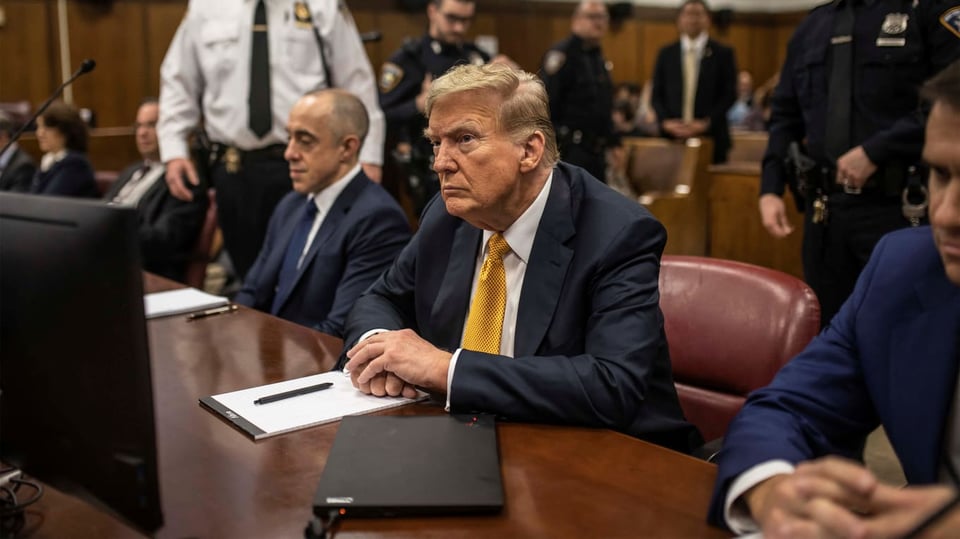
Donald Trump’s defense team rested their case on Tuesday after putting on what The New York Times described as a “minimal defense.”
The Times likely did not intend any disparagement of Trump’s defense with its wording. The article describes how Trump’s team had put on only two witnesses compared to the prosecution’s twenty–hardly an uncommon ratio given that the prosecution bears the burden of proving all aspects of the case while the defense need not put on any evidence at all. The truth is Trump’s defense wasn’t minimal. It was terrible.
After the prosecution laid out its case, Trump’s lawyers could have just relied on what they had done in cross-examination and woven that into their closing argument. Instead, they chose to put on two witnesses: a paralegal at Trump lead attorney Todd Blanche’s firm and Robert Costello, a former federal prosecutor who has represented many notable clients, including Rudy Giuliani and former Yankees owner George Steinbrenner, and who at one point advised Michael Cohen.
The paralegal, Danny Sitko, was put on the stand essentially as a records custodian to help admit some phone records. Costello, fresh off his visit with the GOP-led House Select Subcommittee on the Weaponization of the Federal Government, was put on to attack Cohen, Trump’s former fixer and a key witness for the prosecution. The paralegal did fine. Costello, however, was an unmitigated disaster for the Trump defense team.
The idea seemed to be for Costello to build off his appearance in Congress last week in which he commented about Cohen’s testimony in Trump’s trial, saying: “Virtually every statement he made about me was another lie.”
According to Politico, Costello told CBS at the time of the congressional hearing that he had a brief conversation with Trump’s attorney, Todd Blanche, but that their discussion “was not witness prep.”
Costello was referencing the alleged lack of preparation for his congressional testimony, but it could just as well have applied to his trial testimony.
Presumably, Costello was meant to sink Cohen’s credibility on Tuesday by piling onto the hyperbole in the media about how Cohen was the weak link in the prosecution’s case because of his convictions for tax fraud, campaign finance violations, and lies to Congress.
However, Cohen—who certainly does carry baggage that can and will be used by Trump’s defense team—weathered three days of cross-examination by Blanche that was described by law forum Just Securityas “at times bumbling and at times bruising.” Cohen maintained his cool and perhaps even managed to present himself to the jury as a man who has been dishonest in the past, but is telling the truth about his dishonesty. Notably, Cohen never appeared to draw any ire from Judge Juan Merchan, the trial judge.
In contrast, Costello, displayed remarkable arrogance towards Judge Merchan, exclaiming “Jeez!” at the judge’s rulings on Monday, rolling his eyes, and engaging in a stare-down contest with the judge when Merchan reprimanded him. Costello, perhaps, was performing for Trump, but it was an extraordinarily destructive performance in part because it elicited disapproval from the judge at least partially in the presence of the jury.
In fact, Costello managed to anger Merchan so much that Merchan cleared the courtroom to fully dress down Costello, telling him that his behavior was “contemptuous” and threatening to remove him from the witness stand and/or strike his testimony altogether.
Also in contrast to Cohen was Costello’s performance under cross-examination by prosecutor Susan Hoffinger, who put on a masterclass of dissecting Costello. As MSNBC’s Katie Phang observed: “Costello being difficult with Hoffinger just makes him more dislikable to the jury. He is being impeached by exhibit after exhibit.”
If Costello’s mission as a witness was to undercut Cohen’s credibility, he failed. What he did do was undercut his own credibility and likely leave the jury with the overall impression that Trump’s legal team sought to implement a mob-style loyalty atmosphere to prevent Cohen from cooperating with the government. Ironically, Costello’s testimony coincided with comedian Joe Piscobo’s appearance in Trump’s court entourage, which fully completed the Wise Guys atmosphere.
It's worth remembering that while a defendant does not have to put on any case at all, once they do that evidence is fair game for the prosecution. A former prosecutor colleague of mine, Julie Grohovsky, used to very effectively remind juries of that in closing arguments in cases where the defense chose to put on a case. A former director of training, she would make the point that while the government fully bore the burden of proof throughout a case, that did not mean the jury could not consider the weaknesses of evidence put forth by the defense. Put simply, being presumed innocent does not give you a free pass to put forth lousy evidence and testimony.
If the New York jury returns a guilty verdict against Trump, then his legal team may rue their decision to put on a case at all. Legendary defense counsel Johnny Cochran, arguing that forensic evidence had been tainted in the O.J. Simpson case, used the phrase: “You get garbage in, you get garbage out.” Trump’s defense team might have done well to remember Cochran’s words in deciding whether to put on a case featuring Robert Costello. (The Daily Beast).
_________________________________________________
Important Abortion News.
Doctors urge Supreme Court to keep abortions in medical emergencies legal.
A letter signed by physicians from all 50 states asks the high court to uphold a federal law called EMTALA, which is being challenged by the state of Idaho.

Nearly 6,000 doctors, hailing from all 50 states, have drafted a letter asking the Supreme Court to uphold a federal law that requires hospital emergency departments to provide abortions when they are needed to stabilize patients.
The letter, organized by the left-leaning Committee to Protect Health Care and shared first with The 19th, concerns the case Idaho v. United States, which the high court heard in April.
In that case, the federal government has argued that the Emergency Medical Treatment and Labor Act — a 1986 law known as EMTALA — requires that hospitals participating in the federal Medicare program provide abortions if doing so is the necessary treatment in an emergency. Idaho has contested that interpretation, and argued that its state-level abortion ban supersedes federal law. Idaho’s current ban allows an exception only if the procedure will save the life of the pregnant person, but not if it will otherwise preserve their health.
“We know firsthand how complications from pregnancy can lead very quickly to a medical crisis, requiring immediate care and treatment,” states the letter, which was signed by doctors across specialties whose abilities to provide care could be affected by a ban, including oncology, emergency medicine and anesthesiology. “These patients’ complications can range from a miscarriage to heavy bleeding, from placental abruption to a stroke from severe preeclampsia – and doctors and health professionals in emergency departments must be allowed to use the full range of medical options to save these patients’ lives, including abortion.”
The case is one of two abortion-related challenges the court has heard this term, and one of the first since the overturn of Roe v. Wade in the 2022 decision Dobbs v. Jackson Women’s Health Organization. A decision is expected this June.
The court has held that, while this case is pending, the federal government cannot enforce EMTALA in Idaho. As a result, patients in the midst of medical emergencies have flown to Utah — the next closest state with abortion access — to receive treatment.
Abortions that would be covered by EMTALA constitute only a tiny fraction of terminations performed in the United States. Still, the case has sparked tremendous concern among physicians.
“If someone is having a crisis and part of the treatment involves an abortion — or any procedure or intervention that might be deemed an abortion by a prosecutor down the road — that is something we shouldn’t have to think about,” said Dr. Rob Davidson, a prosecutor down the road — that is something we shouldn’t have to think about,” said Dr. Rob Davidson, a Michigan-based emergency physician and the committee’s executive director. “When I have a pregnant woman having a crisis, my first call should be to an OB, and not a lawyer.”
It’s not clear how the Supreme Court will rule, but their decision could have implications well beyond abortion. Already, the fear of violating strict abortion bans has deterred aspiring and practicing physicians from setting up shop in states with such laws — particularly in Idaho, which has seen an exodus of maternal-fetal medicine specialists in the almost two years since Roe’s fall. Physicians in the state worry a court finding in favor of Idaho might exacerbate that trend.
Legal scholars say that if the court finds EMTALA does not protect abortion as one form of emergency medical care, states could subsequently restrict other treatments — undercutting the law’s core holding that patients who present at emergency rooms are guaranteed to at least receive stabilizing treatment.
“The basis of Dobbs is states have the power to regulate medical care. If you extend that to EMTALA, you open up EMTALA to whatever drama a state wants to play out in its emergency rooms,” Sara Rosenbaum, a professor emerita of health law and policy at George Washington University who has written extensively about EMTALA, told The 19th last month.
This could theoretically include prohibiting hospitals from providing emergency care for patients with HIV or substance use disorder — treatment they would ordinarily be required to provide.
“What if someone says, ‘We don’t believe in harm reduction programs for opioid use disorder, so we don’t think we should provide naloxone kits when patients leave the ER?’” Davidson asks. “This is bad enough that I don’t have to imagine what could happen next, or what else they could carve out. But you’re opening a Pandora’s box.” (19thnews.org)
_________________________________________________
Have a great Memorial Day weekend. I will see you on Tuesday.
_________________________________________________